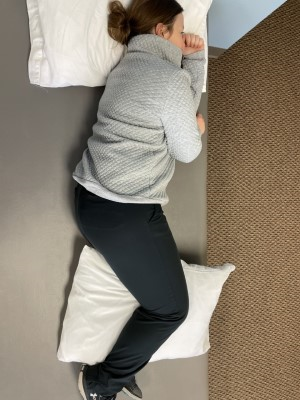
5 Tips For Better Sleeping Throughout Pregnancy
Leave a CommentBeing well-rested and getting enough sleep are vital in a healthy pregnancy. Your body is building a baby, which takes a lot of energy! Although sleeping is important during this time, there are many obstacles to getting good sleep when pregnant. With pregnancy comes body aches and pains, leg cramps, the extra weight that can lead to shortness of breath, and insomnia due to changing hormones. Here are 5 tips for prioritizing sleep, despite these hurdles.
1. Daily Exercise
Physical activity can lead to a better night’s sleep, among its many benefits during pregnancy. The CDC recommends 150 minutes per week of moderate aerobic activity when pregnant. This can be broken down to a 30-minute workout 5 times per week. Be sure to consult your healthcare provider to ensure you’re being safe with your workouts. Every pregnancy is different but common ways to get activity while pregnant include walking, swimming, biking, or yoga.
2. Establish a Routine
When pregnant, your hormones are changing; therefore, it’s important to tell your body it’s time for sleep. This may look a little different for everyone, but in general, it’s important to set the mood and promote relaxation. Some ideas may include meditation, avoiding screens prior to bed, dimming the lights, or writing in a journal or reading.
3. Try Sleeping on your Left Side
In general, the safest sleeping position when pregnant is lying on your side. If able, sleeping on your left side is best for you’re your organs’ position. It helps facilitate blood flow to your heart, kidneys, and uterus, in turn improving oxygen and nutrients to the baby! Avoid sleeping on your back due to the weight of the uterus on your spine and major blood vessels.

4. Use Pillows for Comfort
When pregnant, the growing baby and changing hormones can cause body changes and stresses on your hips and back. Using pillows to prop yourself up when sleeping can help relieve tension. Common and helpful positioning can include putting a pillow between your knees, behind your back, in front of you, or all of the above. They make many variations of pillows that you can use during your pregnancy.
5. Time your Water Intake
Water consumption is very important when pregnant. Your blood flow increases in your body to provide for your baby. Staying hydrated can help reduce muscle cramps and decrease swelling. If you drink too much water, too close to bed, though, you may wake up frequently to take extra trips to the restroom.
Start at Athletico
We are here to take care of you throughout your pregnancy and beyond! If you are pregnant or recently delivered and have questions, schedule a free assessment with an Athletico pelvic health specialist. Our team will conduct an assessment and recommend any next steps throughout pregnancy and the fourth trimester.
Find a Pelvic Health Therapist
*Per federal guidelines, beneficiaries of plans such as Medicare, Medicaid, Tricare, VHA and other federally funded plans are not eligible for free assessments.
The Athletico blog is an educational resource written by Athletico employees. Athletico bloggers are licensed professionals who abide by the code of ethics outlined by their respective professional associations. The content published in blog posts represents the opinion of the individual author based on their expertise and experience. The content provided in this blog is for informational purposes only, does not constitute medical advice and should not be relied on for making personal health decisions.
